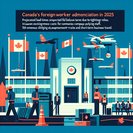
Immigration, Refugees and Citizenship Canada (IRCC) rolled out real-time application tracking earlier this quarter, but Indian applicants say the new tool has not cured chronic processing delays. Fresh data published on 19 November 2025 show study-permit decisions from India averaging four weeks—an improvement of a single week—while new work-permit files still take ten weeks .
The real pain point is inside Canada: extensions of study permits linger at 12 weeks, and in-Canada work-permit extensions average 227 days. For international graduates relying on post-study work options, the limbo hampers job starts, payroll enrolment and health-insurance eligibility. Recruiters in Toronto and Vancouver report candidates postponing onboarding dates or choosing the UK and Australia instead, despite higher living costs there.
![Canada’s Real-Time Tracker Fails to End Visa Backlogs for Indians]()
IRCC attributes the bottlenecks to surging Indian volumes—India now supplies roughly 41 percent of Canada’s foreign students—plus enhanced security vetting and uneven workloads across overseas and domestic visa offices. While the real-time dashboard improves transparency, it merely shows the backlog in motion.
Employers sending Indian staff to Canada should build six-month lead times for work-permit extensions and monitor IRCC’s weekly tracker for movement. Universities advising January-2026 intakes are encouraging students to file complete applications no later than early December to avoid deferrals.
The real pain point is inside Canada: extensions of study permits linger at 12 weeks, and in-Canada work-permit extensions average 227 days. For international graduates relying on post-study work options, the limbo hampers job starts, payroll enrolment and health-insurance eligibility. Recruiters in Toronto and Vancouver report candidates postponing onboarding dates or choosing the UK and Australia instead, despite higher living costs there.

IRCC attributes the bottlenecks to surging Indian volumes—India now supplies roughly 41 percent of Canada’s foreign students—plus enhanced security vetting and uneven workloads across overseas and domestic visa offices. While the real-time dashboard improves transparency, it merely shows the backlog in motion.
Employers sending Indian staff to Canada should build six-month lead times for work-permit extensions and monitor IRCC’s weekly tracker for movement. Universities advising January-2026 intakes are encouraging students to file complete applications no later than early December to avoid deferrals.









